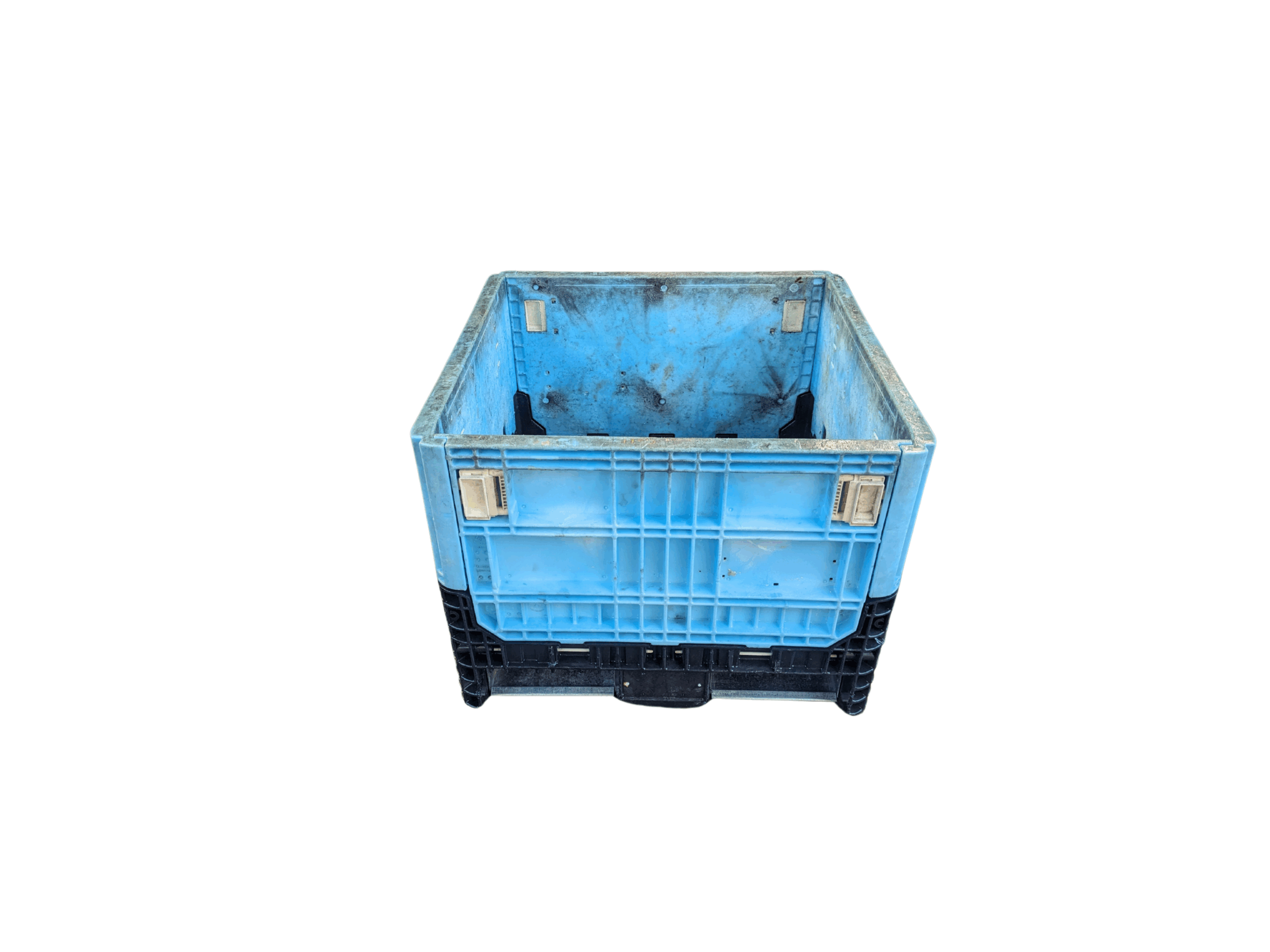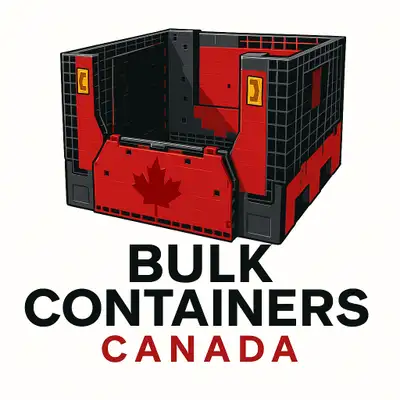Why Bulk Containers Are Vital for Cost-Effective and lasting Transportation
Mass containers play a necessary role in contemporary logistics. They promote the efficient motion of large amounts of goods, thus maximizing transport procedures. This technique not only minimizes costs however additionally lessens ecological effect through lower discharges and waste generation. As sectors look for even more lasting practices, the fostering of bulk containers is ending up being increasingly significant. What effects does this change hold for future logistics and supply chain management?

The Benefits of Making Use Of Bulk Containers in Logistics
Mass containers revolutionize logistics by enhancing effectiveness and sustainability. These containers allow for the transport of large amounts of items in a solitary trip, markedly reducing the number of trips called for. This not just simplifies operations yet likewise decreases labor expenses connected with handling, loading, and unloading. In enhancement, mass containers are made to enhance area usage within transport vehicles, guaranteeing that more items can be delivered concurrently.
The standardization of mass containers additionally streamlines the logistics procedure. With uniform dimensions, they can be easily stacked and kept, resulting in boosted warehouse management. Mass containers typically include durable materials that secure contents from damage during transportation, thus lowering item loss and increasing total integrity. Consequently, services can experience boosted supply chain performance, ultimately bring about increased earnings and consumer satisfaction. This mix of variables makes bulk containers a vital asset in modern-day logistics.
Ecological Impact: Lowering Waste and Carbon Footprint
As markets significantly prioritize sustainability, the adoption of mass containers has become an essential technique for minimizing waste and reducing carbon footprints. These containers lessen making use of product packaging products, such as boxes and plastic, therefore significantly decreasing total waste generation. By settling deliveries, mass containers enhance transport performance, permitting even more items to be carried per journey. This reduction in journeys straight correlates with reduced greenhouse gas emissions, adding to a smaller carbon impact.
In addition, bulk containers can frequently be recycled or reused, additionally reducing ecological influence. The resilience of these containers guarantees they can withstand multiple transport cycles, decreasing the need for single-use choices. refurbished bulk containers. By enhancing logistics and promoting effective source usage, mass containers not just support sustainable techniques but likewise encourage industries to line up with worldwide ecological objectives. Inevitably, their application mirrors a dedication to environmental stewardship and accountable source administration
Cost Cost Savings: Exactly How Mass Containers Lower Transport Expenditures
While many business look for ways to enhance their bottom line, the usage of mass containers provides a substantial opportunity for reducing transport expenditures. Mass containers take full advantage of the volume of products delivered, allowing businesses to ship larger amounts at the same time. This performance decreases the number of journeys called for, directly decreasing fuel expenses and reducing labor costs related to loading and dumping.
Furthermore, mass containers typically feature streamlined designs that enhance space use within transport automobiles. This means fewer vacant areas, resulting in more efficient usage of available capacity. In addition, the resilience of mass containers can lower the danger of product damage throughout transportation, guaranteeing and lowering losses that more products show up intact.
Enhancing Supply Chain Performance With Bulk Storage Space Solutions
Mass storage space solutions play an important role in boosting supply chain effectiveness by optimizing inventory administration. By consolidating products into less, bigger containers, businesses can considerably reduce dealing with prices linked with frequent transfers and handling. This structured approach enables far better monitoring and monitoring of supply, eventually causing boosted functional efficiency.
Structured Stock Administration
Reliable inventory administration is important for optimizing supply chain operations, particularly when organizations embrace bulk storage space remedies. These options enable services to maintain greater supply levels while decreasing the frequency of replenishment. By combining products right into mass containers, companies can enhance their inventory procedures, minimizing the intricacy associated with tracking multiple smaller sized bundles. This approach facilitates precise stock counts and enhances projecting precision, enabling for more educated decision-making. On top of that, mass storage space remedies streamline storehouse company, making it easier to situate and accessibility items when required. Therefore, companies can accomplish a more effective stock turn over rate, ultimately improving general supply chain performance and lowering the chance of stockouts or overstock scenarios.

Reduced Handling Prices
The application of mass storage space remedies not only streamlines inventory monitoring yet also substantially minimizes dealing with expenses throughout the supply chain. By consolidating products right into bulk containers, business minimize the need for constant handling and transfer between various storage and transportation systems. This approach lowers labor costs connected with loading, unloading, and relocating smaller sized bundles. Additionally, mass storage space decreases the regularity of shipments, bring about lower transportation costs and decreased gas consumption. Therefore, businesses can enhance their logistics operations, allowing for a much more efficient allotment of resources. Eventually, lowered managing prices contribute to improved overall supply chain performance, promoting a setting that sustains both sustainability and economic practicality.

Convenience of Mass Containers Throughout Different Industries
Lots of sectors have distinctive demands for transport and storage, bulk containers have actually arised as a flexible remedy that fulfills a broad range of demands. These containers, varying from large bins to specialized storage tanks, can fit varied products, consisting of granules, fluids, and powders. In the farming field, bulk containers promote the transport of plant foods and grains, while the food and beverage industry utilizes them for ingredients and completed products. The chemical sector counts on mass containers for securely moving hazardous materials, guaranteeing compliance with safety policies. Additionally, building companies profit from bulk containers for transporting aggregates and various other materials. Their adaptability expands to different modes of transportation, consisting of ships, trains, and trucks, boosting logistical performance. This adaptability not just enhances operations across various fields yet additionally promotes sustainability by reducing product packaging waste and optimizing room en route. Consequently, bulk containers play a necessary duty in modern supply chain administration.
Future Fads wholesale Container Use and Sustainability
The future of bulk container use is significantly formed by ingenious materials advancement that enhances sustainability. Additionally, automation in logistics assures to streamline operations, reducing waste and improving performance. Accepting round economic situation techniques will certainly additionally transform how bulk containers are made, utilized, and reused, fostering a much more sustainable transportation landscape.
Innovative Products Growth
As sectors increasingly prioritize sustainability, ingenious materials Continued development wholesale containers becomes a considerable element in enhancing green transportation services. Scientists and producers are checking out eco-friendly plastics, recycled composites, and lightweight metals to decrease environmental impact. These materials not only minimize waste yet also enhance fuel performance by reducing the general weight of containers. Furthermore, innovations in clever products, which can adjust to varying problems, improve the sturdiness and capability of bulk containers. The assimilation of these innovative materials straightens with circular economic climate concepts, promoting reuse and recycling. As click for source the need for lasting techniques grows, the advancement of such materials will certainly play an important role in shaping the future of mass container use in logistics and transport.
Automation in Logistics
Considerable improvements in automation are poised to change logistics and the usage of mass containers, boosting sustainability in transport. Automated systems, consisting of drones and self-governing automobiles, are enhancing the motion of mass containers, reducing the reliance on typical fuel-powered transport. These modern technologies maximize directing and filling procedures, improving and lessening vacant miles gas performance. Additionally, automated inventory monitoring systems enhance monitoring and tracking of bulk containers, ensuring much better resource allotment and lowered waste. The integration of the Web of Points (IoT) allows real-time data evaluation, allowing proactive decision-making that aligns with sustainability objectives. As automation continues to evolve, it is anticipated to drive further innovations in bulk container usage, eventually supporting more lasting logistics techniques and minimizing the environmental influence of transportation.
Circular Economic Situation Practices
Improvements in automation are setting the stage for an extra incorporated strategy to round economy techniques in the domain of bulk container use. As industries increasingly accept sustainability, mass containers are being designed for durability and reusability. This change not just minimizes waste however additionally boosts resource effectiveness. Firms are adopting techniques such as closed-loop systems, where utilized containers are collected, reconditioned, and reintroduced right into the supply chain. Furthermore, wise innovations track container life cycles, helping with better monitoring and minimizing ecological effect. The collaboration between manufacturers, logistics service providers, and end-users is essential in developing requirements for lasting container usage. used plastic containers. Future trends indicate an expanding focus on materials that are biodegradable and recyclable, further reinforcing the circular economic climate's principles in bulk transport

Often Asked Concerns
What Products Are Bulk Containers Commonly Made From?
Mass containers are usually constructed from long lasting products such as high-density polyethylene, aluminum, steel, and cardboard. These materials give security, versatility, and strength, making them suitable for carrying various products in various industries successfully.
Exactly how Do I Select the Right Size Mass Container?
Selecting the best dimension mass container involves evaluating the volume of materials to be carried, thinking about handling equipment compatibility, and evaluating storage space needs. Correct dimension guarantees effectiveness in transport and lessens waste throughout shipment.
Are Bulk Containers Reusable or Recyclable?
Mass containers are commonly recyclable, developed for several trips, enhancing sustainability. Several can additionally be reused, depending on the products utilized. Picking why not try this out recyclable alternatives further supports environmental objectives and decreases waste in transportation practices.
What Security Laws Put On Mass Container Transport?
Safety and security regulations for mass container transport include compliance with the Department of Transportation guidelines, appropriate labeling of hazardous materials, architectural stability analyses, and adherence to weight limitations to guarantee safe handling and prevent crashes throughout transit.
Just How Can Services Change to Utilizing Mass Containers Efficiently?
Services can alter to bulk containers by assessing existing logistics, training staff on handling, buying suitable equipment, maximizing supply management, and collaborating with distributors to ensure compatibility and effectiveness throughout the supply chain.
As industries progressively focus on sustainability, the adoption of bulk containers has emerged as a key method for decreasing waste and decreasing carbon impacts. By settling products into bulk containers, companies can simplify their inventory procedures, minimizing the complexity connected with tracking numerous smaller sized plans. As markets increasingly prioritize sustainability, cutting-edge products development in bulk containers arises as a significant aspect in enhancing green transportation services. Automated systems, including drones and independent automobiles, are streamlining the activity of bulk containers, minimizing the dependence on traditional fuel-powered transportation. In addition, automated stock administration systems improve tracking and monitoring of mass containers, making sure far better resource allotment and reduced waste.